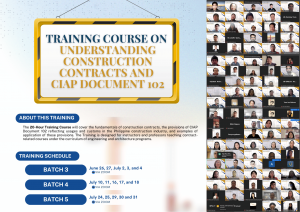PDCB conducts 3 Runs of the Training Course on CIAP Document 102 for the Academe

The Philippine Domestic Construction Board (PDCB) of the Construction Industry Authority of the Philippines (CIAP) successfully concluded three batches of its 𝐓𝐫𝐚𝐢𝐧𝐢𝐧𝐠 𝐂𝐨𝐮𝐫𝐬𝐞 𝐨𝐧 𝐔𝐧𝐝𝐞𝐫𝐬𝐭𝐚𝐧𝐝𝐢𝐧𝐠 𝐂𝐨𝐧𝐭𝐫𝐚𝐜𝐭𝐬 𝐚𝐧𝐝 𝐂𝐈𝐀𝐏 𝐃𝐨𝐜𝐮𝐦𝐞𝐧𝐭 𝟏𝟎𝟐, held via Zoom on June 26–27, July 2–4 (Batch 3), July 10–11, 16–18 (Batch 4), and July 24–25, 29–31 (Batch 5).
Designed to support the proposed integration of CIAP Document 102 into engineering and architecture academic programs nationwide, the training aims to strengthen the foundation of contract literacy among future construction professionals. The program is part of CIAP’s continuing efforts to promote fairness, transparency, and accountability in the Philippine construction industry.
A total of 288 professors and instructors from 74 universities and colleges across the country actively participated in the training sessions. Through comprehensive discussions, the participants explored the relevance and application of CIAP Document 102 in both practice and pedagogy, reinforcing the value of ethical and informed contracting.
In his closing message, CIAP Acting Executive Director Atty. Herbert Matienzo emphasized that “the true value of CIAP Document 102 lies not only in its application but in its instruction.” He underscored the essential role educators play in bringing the principles of ethical contracting into the classroom, thereby helping shape a new generation of professionals committed to responsible and transparent project implementation.
The CIAP and PDCB remain committed to advancing industry knowledge and professional development through accessible and meaningful learning programs that elevate standards across the construction sector.
This training would not have been possible without the invaluable support of PDCB’s pool of accredited lecturers who shared their expertise and knowledge during the training. The PDCB also thanks its partner academic institutions namely the: Philippine Architecture Schools Association (PHILASA), Philippine Association of Engineering Schools (PAES), Pamantasan ng Lungsod ng Maynila (PLM), Visayas State University (VSU), Mapúa University, University of the Philippines (UP), University of Santo Tomas (UST), University of the East (UE), Polytechnic University of the Philippines (PUP), and Aklan State University (ASU).
***
𝐈𝐧𝐭𝐞𝐫𝐞𝐬𝐭𝐞𝐝 𝐭𝐨 𝐣𝐨𝐢𝐧 𝐨𝐮𝐫 𝐥𝐞𝐚𝐫𝐧𝐢𝐧𝐠 𝐩𝐫𝐨𝐠𝐫𝐚𝐦𝐬 𝐨𝐧 𝐜𝐨𝐧𝐬𝐭𝐫𝐮𝐜𝐭𝐢𝐨𝐧 𝐜𝐨𝐧𝐭𝐫𝐚𝐜𝐭𝐬?
Connect with us at the PHILIPPINE DOMESTIC CONSTRUCTION BOARD (PDCB) through our official Facebook Page (https://www.facebook.com/DTI.CIAP.PDCB) or contact us at PDCB@construction.gov.ph or 0917-855-7220 (Viber).



